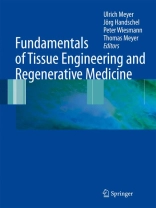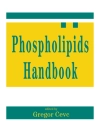‘Fundamentals of Tissue Engineering and Regenerative Medicine’ provides a complete overview of the state of the art in tissue engineering and regenerative medicine. Tissue engineering has grown tremendously during the past decade. Advances in genetic medicine and stem cell technology have significantly improved the potential to influence cell and tissue performance, and have recently expanded the field towards regenerative medicine. In recent years a number of approaches have been used routinely in daily clinical practice, others have been introduced in clinical studies, and multitudes are in the preclinical testing phase. Because of these developments, there is a need to provide comprehensive and detailed information for researchers and clinicians on this rapidly expanding field.
This book offers, in a single volume, the prerequisites of a comprehensive understanding of tissue engineering and regenerative medicine. The book is conceptualized according to a didactic approach (general aspects: social, economic, and ethical considerations; basic biological aspects of regenerative medicine: stem cell medicine, biomolecules, genetic engineering; classic methods of tissue engineering: cell, tissue, organ culture; biotechnological issues: scaffolds; bioreactors, laboratory work; and an extended medical discipline oriented approach: review of clinical use in the various medical specialties). The content of the book, written in 68 chapters by the world’s leading research and clinical specialists in their discipline, represents therefore the recent intellect, experience, and state of this bio-medical field.
Daftar Isi
General Aspects: General and Ethical Aspects.- The History of Tissue Engineering and Regenerative Medicine in Perspective.- Economic Modeling and Decision Making in the Development and Clinical Application of Tissue Engineering.- Ethical Issues in Tissue Engineering.- Sourcing Human Embryonic Tissue: The Ethical Issues.- Tissue Engineering and Regenerative Medicine. Their Goals, Their Methods and Their Consequences from an Ethical Viewpoint.- Biological Considerations: Tissue and Organ Differentiation.- Control of Organogenesis: Towards Effective Tissue Engineering.- Cytokine Signaling in Tissue Engineering.- Influence of Mechanical Effects on Cells. Biophysical Basis.- Engineering Strategies: Engineering at the Genetic and Molecular Level.- Towards Genetically Designed Tissues for Regenerative Medicine.- Posttranscriptional Gene Silencing.- Biomolecule Use in Tissue Engineering.- Engineering Strategies: Engineering at the Cellular Level.- Fetal Tissue Engineering: Regenerative Capacity of Fetal Stem Cells.- Embryonic Stem Cell Use.- The Unrestricted Somatic Stem Cell (USSC) From Cord Blood For Regenerative Medicine.- Mesenchymal Stem Cells: New Insights Into Tissue Engineering and Regenerative Medicine.- Stem Cell Plasticity: Validation Versus Valedictory.- Engineering Strategies: Engineering at the Tissue Level.- Bone Tissue Engineering.- Cartilage Engineering.- Muscle Tissue Engineering.- Tendon and Ligament Tissue Engineering: Restoring Tendon/Ligament and Its Interfaces.- Neural Tissue Engineering and Regenerative Medicine.- Adipose Tissue Engineering.- Intervertebral Disc Regeneration.- Tissue Engineering of Ligaments and Tendons.- Tissue Engineering of Cultured Skin Substitutes.- Dental Hard Tissue Engineering.- Mucosa Tissue Engineering.- Tissue Engineering of Heart Valves.- Engineering Strategies: Engineering at the Organ Level.- Breast Tissue Engineering.- Bioartificial Liver.- Pancreas Engineering.- Tissue-Engineered Urinary Bladder.- Cell-Based Regenerative Medicine for Heart Disease.- Technical Aspects: Biomaterial Related Aspects.- Biomaterials.- Biomaterial-Related Approaches: Surface Structuring.- Mineralised Collagen as Biomaterial and Matrix for Bone Tissue Engineering.- Hydrogels for Tissue Engineering.- Technical Aspects: Scaffold Related Aspects.- Defining Design Targets for Tissue Engineering Scaffolds.- Scaffold Structure and Fabrication.- Prospects of Micromass Culture Technology in Tissue Engineering.- Technical Aspects: Laboratory Aspects and Bioreactor Use.- Laboratory Procedures – Culture of Cells and Tissues.- Bioreactors in Tissue Engineering: From Basic Research to Automated Product Manufacturing.- The Evolution of Cell Printing.- Biophysical Stimulation of Cells and Tissues in Bioreactors.- Microenvironmental Determinants of Stem Cell Fate.- Transplantation Issues: Functional Aspects in Biological Engineering.- Perfusion Effects and Hydrodynamics.- Ex Vivo Formation of Blood Vessels.- Biomechanical Function in Regenerative Medicine.- Influence of Biomechanical Loads.- Transplantation Issues: Immune System Issues.- Innate and Adaptive Immune Responses in Tissue Engineering.- Toll-Like Receptors: Potential Targets for Therapeutic Interventions.- Transplantation Issues: Study Design Principles.- Tissue Engineered Models for In Vitro Studies.- In Vivo Animal Models in Tissue Engineering.- Assessment of Tissue Responses to Tissue-Engineered Devices.- Clinical Use: Clinical Application.- Evidence-based Application in Tissue Engineering and Regenerative Medicine.- Tissue Engineering Applications in Neurology.- Tissue Engineering in Maxillofacial Surgery.- Tissue Engineering Strategies in Dental Implantology.- Tissue Engineering Application in General Surgery.- Regeneration of Renal Tissues.- Tissue Engineering Applications in Plastic Surgery.- Tissue Engineering Applications for Cardiovascular Substitutes.- Tissue Engineering Applications in Orthopedic Surgery.- Tissue Engineering and Its Applications in Dentistry.- Tissue Engineering Applications in Endocrinology.- Regenerative Medicine Applications in Hematology.- The Reconstructed Human Epidermis Models in Fundamental Research.- Clinical Use: Clinical Handling and Regulatory Issues.- Regulatory Issues.












